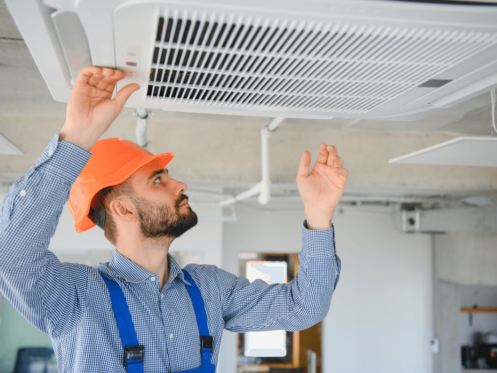Water leaking from an AC indoor unit can be a frustrating problem for homeowners. Not only can it cause damage to your home, but it can also disrupt your comfort. Addressing this issue promptly is crucial to avoid further complications and maintain a comfortable living environment. In this article, we will explore the common causes of water leakage from AC indoor units, provide solutions to fix the problem, and discuss preventive measures to keep your AC running smoothly.
Understanding How Air Conditioners Work
Before diving into the causes and solutions for water leakage, it’s helpful to understand how air conditioners work. Air conditioners cool your home by removing heat from the indoor air and expelling it outside. During this process, moisture from the indoor air condenses on the evaporator coil and is collected in a drain pan. This moisture is then directed outside through a condensate drain line. For a more detailed explanation, you can read about How Air Conditioners Work | HowStuffWorks.
Common Causes of Water Leaking from AC Indoor Unit
Here are some common causes:
- Clogged condensate drain line: The condensate drain line removes moisture from the AC unit. If it gets clogged, water can back up and leak inside your home.
- Dirty air filters: When air filters are dirty, airflow is restricted. This can cause the evaporator coils to freeze and then thaw, leading to water leakage.
- Low refrigerant levels: Low refrigerant levels can cause the pressure inside the AC system to drop, resulting in the evaporator coils freezing and eventually leaking water.
How to Fix Water Leaking from AC Indoor Unit
If you notice water leaking from your AC indoor unit, follow these steps to fix the issue:
- Turn off the AC unit: Before you start any repairs, make sure to turn off the AC unit to ensure safety.
- Check and clean the condensate drain line: Locate the condensate drain line and inspect it for clogs. Use a wet/dry vacuum to remove any blockages.
- Replace or clean air filters: Check the air filters and clean or replace them if they are dirty. This will improve airflow and prevent the evaporator coils from freezing.
- Check refrigerant levels: Low refrigerant levels require professional help. Contact a certified technician to check and refill the refrigerant.
Remember to take safety precautions while performing these steps. If you are unsure or uncomfortable with any of the steps, it is best to seek professional help.
Preventive Maintenance Tips
Regular maintenance is crucial to prevent water leaking from your AC indoor unit. Here are some tips to keep your air conditioner in top shape:
- Schedule regular inspections: Have a professional check your AC unit at least once a year.
- Clean or replace air filters: Dirty filters can cause various issues, including water leakage. Clean or replace them every 1-3 months.
- Monitor refrigerant levels: Low refrigerant can lead to problems, including water leakage. Have a professional check and refill if necessary.
- Keep the area around the unit clean: Remove any debris or dust that could affect the unit’s performance.
For more detailed information on maintaining your air conditioner, visit the Department of Energy’s guide.
Other Common Air Conditioner Problems
While water leaking from your AC indoor unit is a common issue, there are other problems you might encounter. Here are a few:
- AC not cooling properly: This could be due to various reasons, including dirty filters, low refrigerant, or a malfunctioning thermostat. For more information, visit our Air Conditioner Repair page.
- Strange noises: Unusual sounds can indicate issues with the fan, motor, or other components. Learn more about this on our 7 Reasons Why Your AC Fan Is Not Spinning page.
- Unpleasant odors: Bad smells can result from mold growth, dirty filters, or other internal issues. Check out our 5 Reasons Why Your AC Smells Musty page for more details.
- Frequent cycling: If your AC turns on and off frequently, it could be due to an oversized unit, thermostat problems, or other issues.
For a comprehensive list of common air conditioner problems, check out the Department of Energy’s resource.
When to Call a Professional
While some issues can be fixed with a bit of DIY effort, there are times when you need to call in the experts. Here are some signs that indicate the need for professional help:
- Persistent water leakage: If your air conditioner is still leaking water even after you’ve tried to fix it, it’s time to call a professional.
- Strange noises or smells: Unusual sounds or odors coming from your AC unit can be a sign of a more serious problem.
- Inconsistent cooling: If your home isn’t cooling evenly or the AC unit isn’t maintaining the set temperature, you may need expert assistance.
For reliable and professional HVAC services, reach out to Quality Cooling & Heating. Our team is here to help with all your air conditioning and heating needs, ensuring your home remains comfortable and safe.
Summary and Next Steps
Water leaking from an AC indoor unit is a common issue but one that needs prompt attention to avoid damage and discomfort. Here’s a quick recap of what we’ve covered:
- Understanding how air conditioners work and why they might leak water
- Importance of regular maintenance to prevent future leaks
- Other common air conditioner problems to be aware of
- When to call a professional for help
Regular maintenance and prompt attention to any issues can keep your air conditioner running smoothly. If you’re experiencing persistent problems or need professional assistance, don’t hesitate to contact Quality Cooling & Heating for expert HVAC services and plumbing needs. We’re here to ensure your home stays comfortable year-round.


